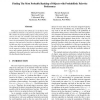Free Online Productivity Tools
i2Speak
i2Symbol
i2OCR
iTex2Img
iWeb2Print
iWeb2Shot
i2Type
iPdf2Split
iPdf2Merge
i2Bopomofo
i2Arabic
i2Style
i2Image
i2PDF
iLatex2Rtf
Sci2ools
125
click to vote
ICDAR
2009
IEEE
2009
IEEE
Finding the Most Probable Ranking of Objects with Probabilistic Pairwise Preferences
This paper discusses the ranking of a set of objects when a possibly inconsistent set of pairwise preferences is given. We consider the task of ranking objects when pairwise preferences not only can contradict each other, but in general are not binary - meaning, for each pair of objects the preference is represented by a pair of non-negative numbers that sum up to one and can be viewed as a confidence in our belief that one object is preferable to the other in the absence of any other information. We propose a probability function on the sequence of objects that includes non-binary preferences and evaluate methods for finding the most probable ranking for this model using it to rank results of a Microsoft On-line Handwriting Recognizer.
| Added | 18 Feb 2011 |
| Updated | 18 Feb 2011 |
| Type | Journal |
| Year | 2009 |
| Where | ICDAR |
| Authors | Mikhail Parakhin, Patrick M. Haluptzok |
Comments (0)

